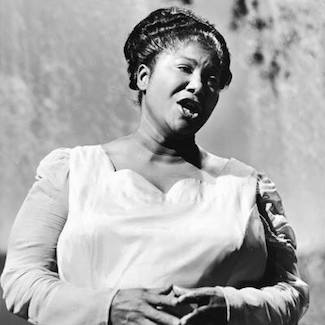The Queen of Gospel
Early Life and Background
Mahalia Jackson was born on October 26, 1911, in New Orleans, Louisiana. She was raised in a devoutly religious environment and was deeply influenced by the music of the church. As a child, she sang in the choir at Mount Moriah Baptist Church, developing a powerful, emotive voice that would later define her career.
Jackson moved to Chicago in 1927 during the Great Migration, where she worked as a housekeeper and laundress while pursuing music. She joined the Greater Salem Baptist Church choir and became associated with Thomas A. Dorsey, the “Father of Gospel Music.” Under his mentorship, she honed her unique style, blending the spiritual fervor of the Black church with blues-influenced melodies.
Rise to Fame
- 1937: Jackson recorded her first single, “God’s Gonna Separate the Wheat from the Tares”, for Decca Records, but it gained little attention.
- 1947: She found breakthrough success with “Move On Up a Little Higher”, which sold over a million copies, making her the first gospel artist to achieve mainstream success.
- 1950s: Performed in Europe, introducing gospel music to an international audience.
- 1956: Appeared on The Ed Sullivan Show, bringing gospel music to a national television audience.
- 1958: Performed at the Newport Jazz Festival, further solidifying gospel music’s place in American popular culture.
Civil Rights Influence and Social Impact
Mahalia Jackson was deeply involved in the Civil Rights Movement and used her music as a powerful tool for social change. Her close relationship with Dr. Martin Luther King Jr. led her to become the unofficial voice of the movement.
- 1963: Performed “I’ve Been ‘Buked and I’ve Been Scorned” before Dr. King’s “I Have a Dream” speech at the March on Washington.
- 1965: Sang at the Selma to Montgomery march, inspiring activists with her soul-stirring performances.
- 1968: Sang at Dr. King’s funeral, moving mourners with her rendition of “Precious Lord, Take My Hand”.
Beyond her civil rights activism, Jackson broke barriers for gospel musicians:
- First gospel singer to perform at Carnegie Hall (1950).
- Advocated for Black economic empowerment, supporting Black-owned businesses.
- Used her platform to promote racial harmony and equality.
Later Life and Legacy
In her later years, Jackson continued to record and perform but faced declining health. She passed away on January 27, 1972, at the age of 60. Her funeral in Chicago drew thousands of mourners, including major figures from the Civil Rights Movement.
Impact and Recognition
- Grammy Lifetime Achievement Award (1972).
- Inducted into the Rock and Roll Hall of Fame (1997).
- Honored with a U.S. postage stamp (1998).
- Her influence shaped artists such as Aretha Franklin, Mavis Staples, and Whitney Houston.
Conclusion
Mahalia Jackson was more than a singer; she was a beacon of hope and a voice for justice. Her legacy in gospel music and the Civil Rights Movement remains unparalleled, proving that music has the power to inspire, heal, and unite.
YouTube Topic Channel:
https://www.youtube.com/channel/UCHAvtOQ_HlQ9P-Xg3mNXcVw
References
- Marovich, Robert. Mahalia Jackson and the Black Gospel Field (2015).
- Darden, Bob. People Get Ready: A New History of Black Gospel Music (2004).
- King, Martin Luther Jr. The Autobiography of Martin Luther King Jr. (1998).


Leave a Reply